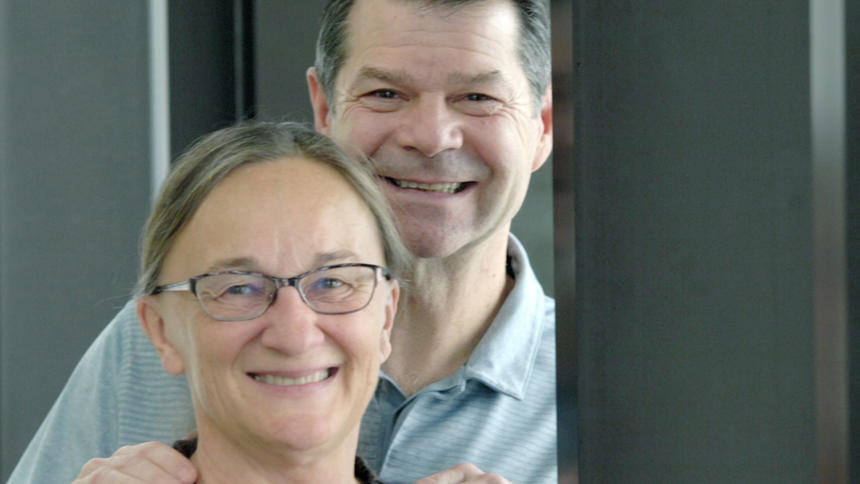After Husband Saves Wife, Couple Promotes CPR Training

Laurie Chuppe, of Bismarck, was in cardiac arrest in January before her husband, Greg, performed CPR on her and saved her life. Mike McCleary / Bismarck Tribune
On Jan. 16, Greg Chuppe's wife, Laurie, went into sudden cardiac arrest.
Laurie Chuppe, 58, had no symptoms that day. No chest pain. No shortness of breath. In fact, that day she walked 5 miles in the Kirkwood Mall and went to the gym. For the Chuppes, there was no indication anything was wrong.
But at 3 a.m., Laurie Chuppe woke up and told her husband she wasn't feeling well. Minutes later, Greg Chuppe said his wife stopped breathing.
"I started CPR right away, but I said her name and I think I said, 'Jesus,'" said Greg Chuppe, who rested a phone on his shoulder, talking with a 911 dispatcher, while doing chest compressions. "Even though she didn't have a heartbeat, it was like I knew this isn't how it's ending, but I knew I had to respond."
This Thanksgiving, Greg and Laurie Chuppe said they are thankful to be spending another holiday together with their children and many grandchildren.
Greg Chuppe, 58, a Bismarck chiropractor, learned CPR during his schooling, as well as through his clinic, Chuppe Chiropractic. Yet many people remain untrained and are unaware how to act in emergency situations, where every minute is critical.
Laurie Chuppe is grateful her husband reacted. Now, the two are advocating for more people to learn CPR.
"You don't ever think you're going to use it," Laurie Chuppe said. "Of course, you hope you don't have to."
According to Dr. Boban Mathew, a cardiologist with CHI St. Alexius Health's Heart and Lung Clinic, the survival rate for a person who has a cardiac arrest outside of a hospital setting is about 10 to 15 percent. And the chance is dramatically increased if the person gets CPR while waiting for first responders, he said.
A heart attack is different from cardiac arrest. A heart attack occurs when a part of the heart doesn't get enough blood, while cardiac arrest happens when the heart suddenly stops pumping blood. A cardiac arrest can be a complication of a heart attack or can occur without one.
More than 350,000 people experience sudden cardiac arrest annually, according to the American Heart Association.
Laurie Chuppe doesn't remember much from the day she went into sudden cardiac arrest, nor the days leading up to it. Greg Chuppe did chest compressions for about 7 minutes until first responders arrived with an automated external defibrillator, or AED.
She was taken to CHI St. Alexius Health in Bismarck, where she lost her pulse again and had three stents placed in her heart. After that, her doctor used therapeutic hypothermia to cool her body down to attempt to reduce brain damage. She was in a coma for 36 hours.
Greg Chuppe isn't sure what went through his mind when he immediately acted.
"I knew it was a critical situation, but I fully expected her to be OK," Greg Chuppe said.
"He said it never crossed his mind that I might not make it. I don't know if it was your faith in God," Laurie Chuppe said.
"I just had faith that she was going to come out of it," Greg Chuppe said.
Laurie Chuppe was hospitalized for seven days, but has since made a full recovery and quickly returned to work.
"It's amazing. I personally couldn't fault anyone, because I don't know how I would do. Especially if it's a loved one. I think sometimes you go into panic mode," she said.
Greg and Laurie Chuppe purchased a personal AED that Greg Chuppe said he'll carry around with him, even when he's hunting in the Badlands.
"Heart disease is the No. 1 killer in the United States...you're going to be around someone or know someone who's going through it. It is going to happen at some point," Greg Chuppe said.
Story Credit: http: //grandforksherald.com/lifestyle/health/4532657-after-husband-saves-wife-couple-promotes-cpr-training
Since you’re here, we have a small favor to ask. Requests from schools and districts for our screening services are growing, which means that the need for funds to cover the cost of those services is also growing. We want to make our services available to those who request it and beyond, so you can see why we need your help. Safebeat heart screenings take a lot of time, money, and hard work to produce but we do it because we understand the value of a child's life, PRICELESS!
If everyone who reads this likes it and helps fund it, our future would be more secure. For as little as $1, you can support Safebeat and it only takes a minute. Make a contribution. -The SafeBeat Team


